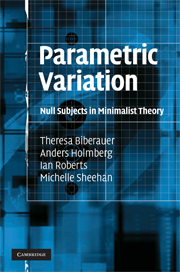Book contents
- Frontmatter
- Contents
- Acknowledgements
- Introduction: parameters in minimalist theory
- 1 A deletion analysis of null subjects
- 2 Null Subject Parameters
- 3 Control into finite clauses in partial null-subject languages
- 4 Semi null-subject languages, expletives and expletive pro reconsidered
- 5 The null generic subject pronoun in Finnish: a case of incorporation in T
- 6 ‘Free’ inversion in Romance and the Null Subject Parameter
- 7 Subjects, Tense and verb-movement
- 8 Varieties of French and the Null Subject Parameter
- Bibliography
- Index
Introduction: parameters in minimalist theory
Published online by Cambridge University Press: 04 August 2010
- Frontmatter
- Contents
- Acknowledgements
- Introduction: parameters in minimalist theory
- 1 A deletion analysis of null subjects
- 2 Null Subject Parameters
- 3 Control into finite clauses in partial null-subject languages
- 4 Semi null-subject languages, expletives and expletive pro reconsidered
- 5 The null generic subject pronoun in Finnish: a case of incorporation in T
- 6 ‘Free’ inversion in Romance and the Null Subject Parameter
- 7 Subjects, Tense and verb-movement
- 8 Varieties of French and the Null Subject Parameter
- Bibliography
- Index
Summary
This book represents some of the work carried out in the period 2002–2007 by the group working on the project ‘Null Subjects and the Structure of Parametric Theory’, funded by the Arts and Humanities Research Council, Great Britain (Grant No. APN14458). The group consisted of Theresa Biberauer, Anders Holmberg, Chris Johns, Ian Roberts, Michelle Sheehan and David Willis. The central goal of that project was to investigate and, if possible, refine the notion of parameter of Universal Grammar (UG), as it has been understood in generative theory since roughly 1980, by looking carefully at the phenomena associated with one of the best-known and most widely discussed examples of a parameter: the Null Subject Parameter (NSP). This volume brings together a number of articles focusing on the nature of null subjects in a range of languages; Biberauer (2008b) is a sister volume arising from the same project, which focuses more on parameter theory than on null subjects, while Holmberg (2009) focuses on partial null-subject languages.
In this Introduction, we would like to set the chapters in context. Accordingly, we first discuss the phenomena from English and various Romance languages which originally motivated the postulation of the NSP. Next, we summarise the main kinds of null-subject system that have been identified in the comparative-syntax literature. We complete Section 1 by summarising the two principal approaches to the analysis of null subjects, whose classical exponents are Rizzi (1986a) and Borer (1986).
- Type
- Chapter
- Information
- Parametric VariationNull Subjects in Minimalist Theory, pp. 1 - 57Publisher: Cambridge University PressPrint publication year: 2009
- 12
- Cited by

